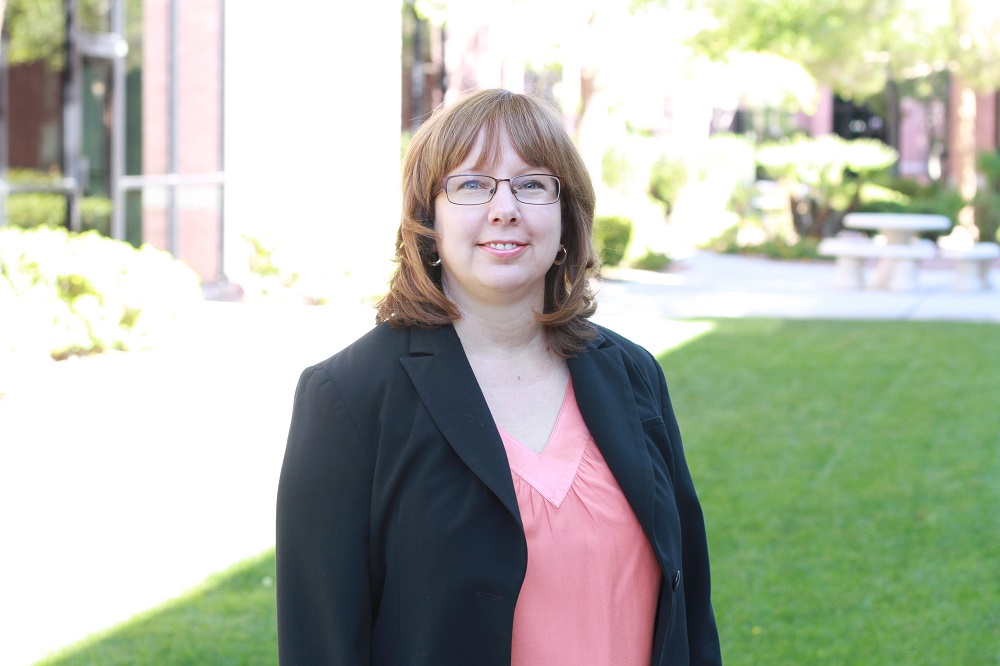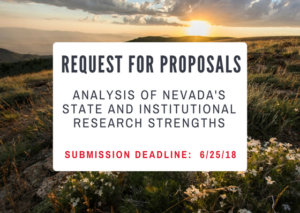The new data dashboards will focus on NSHE strategic goals of Access, Student Success, Closing the Achievement Gap, Workforce, and Research.
Archive for the ‘News’ Category
Request for Proposals: Analysis of Nevada’s State and Institutional Research Strengths

The Nevada System of Higher Education (NSHE) will be submitting a proposal to the National Science Foundation’s (NSF) Established Program to Stimulate Competitive Research (EPSCoR), Research Infrastructure Improvement (RII) Track-1 program in summer 2019. To strategically inform the selection of a research theme for the proposal, NSHE is seeking an analysis of its state and institutional research strengths so that the Track-1 proposal builds on the existing strengths and critical mass of expertise. Submission Deadline: 6/25/18 by 5:00 pm PST.
Background
EPSCoR was started in 1978 to assist NSF in its statutory function “to strengthen research and education in science and engineering throughout the United States and to avoid undue concentration of such research and education.” EPSCoR goals are to provide strategic programs and opportunities for EPSCoR participants that stimulate sustainable improvements in their R&D capacity and competitiveness, and to advance science and engineering capabilities in EPSCoR jurisdictions for discovery, innovation and overall knowledge-based prosperity. Nevada has been an EPSCoR jurisdiction since 1985.
NSF EPSCoR RII Track-1 awards provide up to $4 million per year for up to five years. They are intended to improve the research competitiveness of jurisdictions by improving their academic research infrastructure in areas of science and engineering supported by the NSF and critical to the particular jurisdiction’s science and technology initiative or plan.
As per the NSF EPSCoR Track-1 FY18 solicitation, submitting states must describe the status of their academic R&D enterprise, including the strengths, barriers, and opportunities for development of the academic institutions in support of overall R&D objectives. The state must provide a convincing rationale for the project’s scientific vision and indicate how the overall strategy, proposed implementation mechanisms, and infrastructure support will mitigate the identified barriers and improve academic research competitiveness. The state must also explicitly describe the alignment of the proposed research with the STEM research priorities of the jurisdiction S&T Plan.
NSHE includes three research institutions which participate in the Track-1 program. The University of Nevada, Las Vegas (UNLV) is an urban research institution with 30,000 students and $66M in research expenditures in FY17. The University of Nevada, Reno (UNR) is a land-grant institution with 20,000 students and $106M in research expenditures in FY17. The Desert Research Institute (DRI) is a soft-money research institution with $36M in research expenditures in FY17.
Proposal
NSHE is seeking an analysis to identify in what areas and along what dimensions the state and its institutions have research strengths so that the Track-1 proposal builds on the existing strengths and critical mass of expertise at the three institutions. We are ultimately seeking to select one or more research themes that meets the following criteria:
- Area of research strength at DRI and UNLV and UNR,
- The research area is in alignment with priorities in NSHE’s 2015 Science and Technology Plan, and
- The research area is fundable by NSF.
And ideally,
- The research area is in alignment with one or more of NSF’s 10 Big Ideas.
To inform the selection of the best research area for the Track-1 proposal, the following analyses are requested.
- Mapping of DRI, UNLV, and UNR common research strengths.
- Mapping of the above common research strengths against NSHE’s 2015 S&T Plan research priorities, NSF’s fundable areas, and NSF’s 10 Big Ideas.
- For each overlapping area of strength and the priorities noted in #2, please provide the performance indicators and top research faculty at each institution (DRI, UNLV, and UNR).
Deliverables
Deliverables include the following:
- A report that summarizes the analysis methods used and the key results in graphic and tabular format with a narrative describing the key points.
- A meeting, via Webex online, with NSHE’s Vice Chancellor for Academic and Student Affairs, Vice Chancellor for Government and Community Affairs, Vice Presidents for Research, EPSCoR Office Director, and the NSF EPSCoR Project Director to explain the results of the analysis.
Proposal Format
The proposal should not exceed 10 pages. Please include the following items in the proposal:
- Name and contact information for lead on this proposal.
- A brief description of organizational background in this area.
- Identify personnel who will produce this report and their expertise or experience in generating reports of this nature.
- The methodology and data sets used to create the report.
- The total cost of creating the report and meeting with the Nevada team, not to exceed $25,000.
- Examples of previously created similar reports may be included as attachments along with references or client lists.
Timeline
| Deadline for submitting proposal to NSHE | June 25, 2018 |
| Contract in place | July 3, 2018 |
| Report due to NSHE | July 31, 2018 |
| Online meeting to discuss results | Week of August 6, 2018 |
Submission
Proposals must be submitted to Marcie Jackson at mjackson@nshe.nevada.edu by 5:00 p.m. PST on June 25, 2018.
For questions on content of the report:
Gayle Dana
NSF EPSCoR Project Director
gayle.dana@dri.edu
530-414-3170 cell (best)
775-674-7538 work
For questions on submission requirements of the proposal:
Marcie Jackson
Director, System Sponsored Programs & EPSCoR
mjackson@nshe.nevada.edu
702-522-7079
Marcie Jackson selected as Director of System Sponsored Programs and EPSCoR
 We are happy to announce that Marcie Jackson has been selected as the Director of System Sponsored Programs and EPSCoR. Ms. Jackson has been with SSPO/EPSCoR for over 7 years in the role of NSF EPSCoR Project Administrator.
We are happy to announce that Marcie Jackson has been selected as the Director of System Sponsored Programs and EPSCoR. Ms. Jackson has been with SSPO/EPSCoR for over 7 years in the role of NSF EPSCoR Project Administrator.
Marcie Jackson joined the Nevada System of Higher Education System Sponsored Programs Office & EPSCoR in December 2011. As Director, she provides leadership for the pre-award and post-award administration of all grants and contracts, represents Nevada and NSHE to all EPSCoR program agencies and sponsors, and provides information and support systems to facilitate the acquisition of extramural funding for collaborative programs within the System.
She previously worked as NSF EPSCoR Project Administrator where she was responsible for the budget, finance, and cradle-to-grave grants management of Nevada’s two Research Infrastructure Improvement (RII) awards, which totaled more than $22 million in federal dollars and more than $4 million in state dollars.
Ms. Jackson has more than 17 years of grant proposal development and grant administration experience and has a varied background in higher education, business, civil service, and non-profit management. She holds a Master of Public Administration degree from UNLV, and she is a member of the National Council of University Research Administrators and the Society of Research Administrators International. She served on the System Administration Faculty Senate from 2012-2018 and acted as Chair 2017-2018. She was a member-at-large on the NSF EPSCoR Project Administrator’s Council for 2014-2017.
Nevada NASA EPSCoR Highlight: Science PI Miles Greiner, UNR (Doctoral Student Blake Naccarto, UNLV, pictured)
Advanced Transport Technologies for NASA Thermal Management/Control Systems. The goal of this research is to develop reliable, light-weight, low-power thermal management systems to precisely control the temperatures of critical NASA electronic systems. This research is developing a high-performance, two-phase mechanically pumped fluid loop (2φMPFL; Figure 1) to maintain the temperatures of several components within precise limits, even if their heat generations vary greatly.
CCSD Student Mission Patches Heading to International Space Station
The 4 mission patches below were developed by Clark County School District students for the Student Spaceflight Experiment Program (SSEP) and are headed to the International Space Station on SpaceX-15, which is scheduled to launch on June 28 and may return by the end of July. Please note that the OFK payload is always one of the last payloads unloaded, so the patches will most likely be returned to the communities just before the end of 2018.
Nevada NASA EPSCoR Highlight: David Feil-Seifer, UNR
Socially Aware Navigation Using Nonlinear Multi-objective Optimization. For socially assistive robots (SAR) to be accepted into complex and stochastic human environments, it is important to account for subtle social norms. For this project, we proposed a novel approach to socially aware navigation (SAN), which garnered significant interest from the Human-Robot Interaction (HRI) community. We used a multi-objective optimization tool called the Pareto Concavity Elimination Transformation (PaCcET) to capture nonlinear human navigation behavior, which is a novel contribution to the community.
Giovanny Vazquez, UNLV selected as NADA RA Summer 2018
Congratulations to Giovanny Vazquez, University of Nevada, Las Vegas for being selected as a Summer 2018 Research Associate (RA) at NASA Marshall Space Flight Center! RA sponsored by Nevada NASA Space Grant Consortium.
Nevada NASA EPSCoR Highlight: Xiaoliang Wang, DRI
Particle Detection and Characterization for Spacecraft Fire Safety. Detecting smoke at the earliest stage of a fire is critical for spacecraft safety. Conventional spacecraft smoke detectors are not optimized for space fires and therefore have lower sensitivity and higher false alarm rates. This project established spacecraft fire safety research capabilities in the Nevada System of Higher Education (NSHE) by extending the combustion laboratory capability and leveraging the expertise of aerosol instrumentation, particle characterization, and fire science in NSHE.
Nevada NASA EPSCoR Highlight Elisabeth Hausrath, UNLV
Analysis of Iron-rich X-ray Amorphous Weathering Products on Earth and Comparisons to Measurements from Mars. This funding supported research in the recently deglaciated ultramafic rocks in the Klamath Mountains, as well as in the arid Pickhandle Gulch in Nevada. Weathered materials from these environments were separated and analyzed for comparisons with weathered materials from Mars.
Nevada NASA EPSCoR Highlight: Duane Moser, DRI
Desert Brine Microorganisms and Abiotic Oxidants: New Analog Research Capacity for Nevada. Our goal is to evaluate rare natural brines for their potential utility as analogs to explore the physiological limits for life.
NSF Science360 News Headlines Dr. Scott Abella, UNLV
Knowledge is power: Protecting the desert tortoise featured in “Headlines” in the May 4th, 2018 NSF Science360 News. NEXUS project uses ecological knowledge to enhance the habitat quality for threatened desert wildlife
NASA Seeking Volunteer Reviewers in Earth and Space Science
NASA’s Science Mission Directorate (SMD) is seeking subject matter experts to serve as mail-in and/or panel reviewers of proposals to ROSES and other SMD solicitations. Just follow the links below to the volunteer review forms and click the boxes to indicate the topics in which you consider yourself to be a subject matter expert. If your skills match our needs for that review, we will contact you to discuss scheduling.

